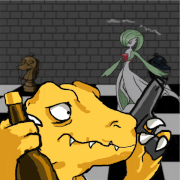|
Something about Caracalla’s bust or the colourization makes him look a lot more real, to my eyes anyway.
|
|
|
|

|
| # ? May 30, 2024 16:49 |
|
It's because caesar decided to preemt k-fashion by 2000 years and gave some circle lenses a go
|
|
|
|
I didn't know Julius Caesar was a direct ancestor of Jonathan Pryce.
|
|
|
|
When you hear someone open the door and just freeze
|
|
|
|
King of False Promises posted:The same artist who did the Nero sculpture did a few others, too. Here's Caesar: 
|
|
|
|
Vincent Van Goatse posted:I didn't know Julius Caesar was a direct ancestor of Jonathan Pryce. I had the same thought
|
|
|
|
Fresh water location most likely to be strongest component of determining the location of ahu and moai https://arstechnica.com/science/2019/03/scientists-think-theyve-solved-one-mystery-of-easter-islands-statues/ quote:Chile's Easter Island (Rapa Nui) is famous for its giant monumental statues, called moai, built by early inhabitants some 800 years ago. The islanders likely chose the statues' locations based on the availability of fresh water sources, according to a recent paper in PLOS One.
|
|
|
|
Hi, weird random question, but do you all know of any good fair use Late Antiquity music? Roman, "barbarian", whatever. As authentic as possible given what we know. Does that even exist?
|
|
|
|
Alikchi posted:Hi, weird random question, but do you all know of any good fair use Late Antiquity music? Roman, "barbarian", whatever. As authentic as possible given what we know. Does that even exist? The first thing that comes to mind is the music for the Rome Total War mod Europa Barbarorum, which was very focused on authenticity and had a full soundtrack developed for it. Navigating fair use can be tricky, but it's an old freely available mod so I would imagine that it would be a good candidate for whatever you're doing. They have samples here, with the full tracks embedded in the complete mod download. https://www.europabarbarorum.com/EB1/downloads_music.html Oh sad those links are dead. Try this sample on YouTube: https://youtu.be/83anJ5L-2lw Kaal fucked around with this message at 21:15 on Mar 25, 2019 |
|
|
|
I found this playlist: Late Antiquity to Early Renaissance https://open.spotify.com/user/noehernandez767/playlist/1fAtDQH8kDqlsMP33XCs57?si=M0VnjCn-RqKv5b8ZQ1-ZKg Seems to be pretty good. No barbarian stuff though. And nothing from before 500 which is what I want most, 400-476.
|
|
|
|
Alikchi posted:I found this playlist: Here's the Te Deum, which is actually a 4th century hymn, not 5th. https://www.youtube.com/watch?v=sqwV9l-U8ds More generally, the first four Ambrosian Hymns are generally considered to be written by Ambrose himself in the 4th century, and the rest of them are also probably 4th or 5th century.
|
|
|
|
Oh excellent, thank you.
|
|
|
|
Fuschia tude posted:I know it's been a few pages since the Nero reconstructed face, but your avatar reminded me of this image I ran into recently. An artist painted over this bust of Caracalla with their idea of what the colors would have looked like. I think that’s very good. Maybe not garish enough
|
|
|
|
Anyone have any book recommendations for China in the period between the fall of the Han and the Sui/Tang reunification? I'm realizing it's kind of a black hole in my understanding of the place. Even for the Cambridge History series, that period is one of like 2 books that they still haven't gotten around to after like 60 years.
|
|
|
|
Fuschia tude posted:I know it's been a few pages since the Nero reconstructed face, but your avatar reminded me of this image I ran into recently. An artist painted over this bust of Caracalla with their idea of what the colors would have looked like. Oh what do you know, Oberyn Martell was a real person.
|
|
|
|
Preface by saying I haven't read it yet, but the book I got on that period that was recommended the most was China Between Empires by Mark Edward Lewis.
|
|
|
|
Koramei posted:Anyone have any book recommendations for China in the period between the fall of the Han and the Sui/Tang reunification? I'm realizing it's kind of a black hole in my understanding of the place. Even for the Cambridge History series, that period is one of like 2 books that they still haven't gotten around to after like 60 years. If we're sticking with English language introductory books I'd also start with China Between Empires. It doesn't limit itself to military or political history and includes a brief discussion of the social and economic changes of the period. The Cambridge History of China might finally publish their second book on the period this year, and the last volume on the Sui and Tang is due out 2020! Is there anything you're looking for in particular - something on the Three Kingdoms period, the Jin dynasty, the Northern and Southern dynasties?
|
|
|
|
Are there any like, fun pop histories about specific medieval or ancient Chinese periods or people? Something not too dense, maybe beach reading style? Or are there any entertaining classical histories? I admit I found most of the ancient Chinese prose I've read really boring compared to Greek and Roman authors. I mean its hard to beat Caesar on that front when he's all like "and when my men's courage wavered I grabbed a shield and charged the enemy alone, catching a million arrows on my shield, until the soldiers were shamed into following me," but I feel like a lot of Chinese authors don't even try. Most of what they right is like in a super tedious and impersonal courtly style.
|
|
|
|
I haven't found much for older China. You're right about the primary sources, they're basically all court histories written well after the fact and there's nothing like Caesar or Tacitus' writing. It's not an ancient subject at all but God's Chinese Son and Autumn in the Heavenly Kingdom were both really good books on the Taping Rebellion.
|
|
|
|
Grand Fromage posted:I haven't found much for older China. You're right about the primary sources, they're basically all court histories written well after the fact and there's nothing like Caesar or Tacitus' writing. It's not an ancient subject at all but God's Chinese Son and Autumn in the Heavenly Kingdom were both really good books on the Taping Rebellion. Would second both these books, picked them up years ago after a similar recommendation and the topics stuck with me ever since.
|
|
|
|
Unfortunately, the pop history stuff about the early dynasties all tends to be either in Chinese or Japanese  I mean some of these dynastic histories in Chinese history are not translated at all either. The chronicle of the three kingdoms (San guo zhi), the Book of Han (Han shu), and the Book of the Later Han (Hou han shu) do not have a complete translation into English. The Commentaries of Zuo have only one complete English translation and that was written in the 19th century. The Zizhi Tongjian has never been fully translated into English, although people like Rafe de Crespigny and Achilles Fang have each done translations of specific chapters. The structure of these court histories is also different - it's not presented as a single continuous narrative like Thucydides, but a collection of biographies with analysis and commentary. Military history is sometimes neglected, often to the point of listing only places and dates for battles. Burton Watson did a great partial translation of some of the interesting bits of Sima Qian's book. Somebody named Nienhauser is doing a complete annotated edition of Sima Qian but that's in nine volumes and probably priced way too high for the average reader. Graff wrote a history of "medieval" warfare (between 300-900) which is more dense and political but it's something a more dedicated student can approach. I'm seconding the books on the Taiping, and I'd also recommend Ray Huang's book 1587: A Year of No Significance if you want an interesting introduction to the Ming. It's history through several chapter-length biographies of figures in the late Ming. For the three kingdoms period, you may want to try Rafe de Crespigny's books. His biography of Cao Cao and history of the later Han would be something meaty to start off with. Read the previews or whatever you can find on Google Books and see what's good. Kangxi fucked around with this message at 00:35 on Mar 30, 2019 |
|
|
|
Does anyone have any suggestions for a history of Zoroastrianism or Jainism? I've picked up a lot of history about Christianity/Islam/Judaism/Hinduism/Buddhism in the past and was interested in learning about some of the next tier (by population). Any other suggestions for religions that don't get as much media?
|
|
|
|
biographies are a pretty good way to introduce yourself to new periods, imo. One unfortunate characteristic I've noticed in Chinese secondary histories is that they get infected by the ghastly courtly annals style of the old authors, absorbing that tendency towards endless lists of the schemes of a billion officials each of whom may only be mentioned once and never again. I just wish we had a Chinese Livy to tell us who were the greatest whores of Chang'an. Oh well, I've been meaning to check out Autumn in the Heavenly Kingdom for a while so I'll probably read that. Maybe I'll just get drunk, read my Du Fu collection and cry for the absence of the Chinese narrative history tradition that never was but should have been Squalid fucked around with this message at 00:39 on Mar 30, 2019 |
|
|
|
Philosophy not history, and I haven't read it directly, but all the excerpts from the Zhuangzi I've found have been great:quote:Zhuangzi and Huizi were enjoying themselves on the bridge over the Hao River. Zhuangzi said, "The minnows are darting about free and easy! This is how fish are happy." Huizi replied, "You are not a fish. How do you know that the fish are happy?" Zhuangzi said. "You are not I. How do you know that I do not know that the fish are happy?" Huizi said, "I am not you, to be sure, so of course I don't know about you. But you are obviously not a fish; so the case is complete that you do not know that the fish are happy." Zhuangzi said, "Let's go back to the beginning of this. You said, How do you know that the fish are happy; but in asking me this, you already knew that I know it. I know it right here above the Hao." Kangxi posted:Is there anything you're looking for in particular - something on the Three Kingdoms period, the Jin dynasty, the Northern and Southern dynasties? I guess most of all I'm curious about Jin's collapse/the barbarian incursions and the 16 Kingdoms period, but I'd be open to anything. That said, cool that that Cambridge history is coming out in literally less than a year now; I'll read China Between Empires (thanks for the recommendation guys) but I guess past that I can just wait a bit longer before delving in deeper. Koramei fucked around with this message at 01:10 on Mar 30, 2019 |
|
|
|
The entirety of Zhuangzi is awesome, probably incomparable to anything in the antique western philosophical tradition — the skepticism verging on mysticism and the trolling attitude are of reminiscent of say Heraclitus, Diogenes, Pyrrho, but those guys are only fragments and aphorisms and anecdotes, whereas Zhuangzi is a whole book plus a bunch of later texts in the same tradition. I recommend Ziporyn’s English version; it doesn’t translate all the later chapters sadly (though it does have the one by the butthurt anarchoprimitivist who thinks things like “knowledge” and “leaving your hometown” are the reason why everything sucks so much nowadays), but does a great job of making clear what the book is actually talking about, and you’re going to need that when you run into lines like quote:To use an attribute to show that attributes are not attributes is not as good as using a non-attribute to show that attributes are not attributes. To use a horse to show that a horse is not a horse is not as good as using a non-horse to show that a horse is not a horse. Heaven and earth are one attribute; the ten thousand things are one horse.
|
|
|
|
Zhuangzi would be an insufferable poster.
|
|
|
|
Forsooth, a good deal of his spirit lives in these immortal similisexual forumae
|
|
|
|
In the middle of the night, the skull came to him in his dream and said, “im gay”
|
|
|
|
Koramei posted:Anyone have any book recommendations for China in the period between the fall of the Han and the Sui/Tang reunification? I'm realizing it's kind of a black hole in my understanding of the place. Even for the Cambridge History series, that period is one of like 2 books that they still haven't gotten around to after like 60 years. Empires and Exchanges in Eurasian Late Antiquity. It's a collection of articles intended to be approachable to the lay reader, with a focus on dismissing a lot of fusty, cobwebbed ideas that people still hold on the period. As the title suggests, it is not exclusively about China (although it's a main focus) but it has a lot of really interesting stuff on the 'barbarian' states that colonized the northern plains during this period and the ways that traditional narratives of their 'sinicization' are insufficient and frequently misleading. V good poo poo
|
|
|
|
hello, i just read this book called The Golden Rhinoceros by François-Xavier Fauvelle which is all about the African middle ages and it is very fascinating, can you guys recommend anything else on the same general topic? I am particularly interested in Madagascar if there is anything about them since they're only very briefly mentioned in the book.
|
|
|
|
https://twitter.com/sentantiq/status/1112450503701659649
|
|
|
|
They truly were ahead of their time
|
|
|
|
https://twitter.com/BLMedieval/status/1112659831268261888
|
|
|
|
This is an April Fools joke, right? A rather lame one, if so; it's not dramatic or silly enough. Silver2195 fucked around with this message at 21:43 on Apr 1, 2019 |
|
|
Silver2195 posted:This is an April Fools joke, right? It has to be; Aristotle died in 322 BC.
|
|
|
|
|
Koramei posted:I guess most of all I'm curious about Jin's collapse/the barbarian incursions and the 16 Kingdoms period, but I'd be open to anything. I liked Medieval Chinese Warfare: 300-900 by David Graff, although it has a lot about technology, society, and politics to make up for some of the more threadbare primary sources about war.
|
|
|
|
April wasn't even invented yet, was it? What the hell kind of calendar did the Greeks use at the time anyway?
|
|
|
|
Grand Prize Winner posted:April wasn't even invented yet, was it? What the hell kind of calendar did the Greeks use at the time anyway? Our calendar is essentially the Roman calendar at the time of Augustus Caesar. It's been shifted around because of seasonal drift, but the structure is the same. The names of the months are all Roman, though the origins of February, April, May, and June are debated. The rest are certain: Janus, Mars, Julius (Caesar), Augustus, Seventh/Eighth/Ninth/Tenth Month. Names in English are mostly Germanic deity equivalents to the Roman names, though we still have Saturn's Day. The original Roman calendar did not have January or February, just a 60 day winter period which was not considered part of the year. So April would have always been in the Roman calendar, but it was the second month of the year. The Greeks are, as usual, complicated. There was a different calendar depending on which polis you were in. The majority had twelve months. There's a lot of debate about how they worked because the evidence is patchy and mostly comes from Delphi records.
|
|
|
|
Can someone reccommend books on the Silk Road for kids? My sister's oldest has developed an interest
|
|
|
|

|
| # ? May 30, 2024 16:49 |
|
HEY GUNS posted:Can someone reccommend books on the Silk Road for kids? My sister's oldest has developed an interest https://en.m.wikipedia.org/wiki/A_Bride%27s_Story
|
|
|








































